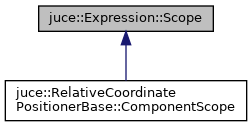When evaluating an Expression object, this class is used to resolve symbols and perform functions that the expression uses.
More...
#include <juce_Expression.h>
When evaluating an Expression object, this class is used to resolve symbols and perform functions that the expression uses.
◆ Scope()
| juce::Expression::Scope::Scope |
( |
| ) |
|
◆ ~Scope()
| virtual juce::Expression::Scope::~Scope |
( |
| ) |
|
|
virtual |
◆ evaluateFunction()
| virtual double juce::Expression::Scope::evaluateFunction |
( |
const String & |
functionName, |
|
|
const double * |
parameters, |
|
|
int |
numParameters |
|
) |
| const |
|
virtual |
Executes a named function.
If the function name is unknown, this can throw an Expression::EvaluationError exception.
- Exceptions
-
| Expression::EvaluationError | |
◆ getScopeUID()
| virtual String juce::Expression::Scope::getScopeUID |
( |
| ) |
const |
|
virtual |
◆ getSymbolValue()
| virtual Expression juce::Expression::Scope::getSymbolValue |
( |
const String & |
symbol | ) |
const |
|
virtual |
Returns the value of a symbol.
If the symbol is unknown, this can throw an Expression::EvaluationError exception. The member value is set to the part of the symbol that followed the dot, if there is one, e.g. for "foo.bar", symbol = "foo" and member = "bar".
- Exceptions
-
| Expression::EvaluationError | |
Reimplemented in juce::RelativeCoordinatePositionerBase::ComponentScope.
◆ visitRelativeScope()
| virtual void juce::Expression::Scope::visitRelativeScope |
( |
const String & |
scopeName, |
|
|
Visitor & |
visitor |
|
) |
| const |
|
virtual |
The documentation for this class was generated from the following file:
